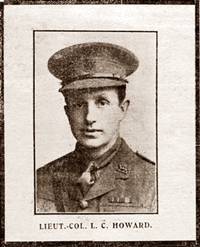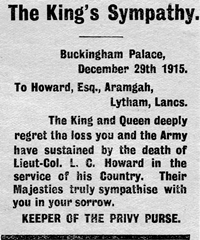|
Lytham
Times, December 1915
Lieut-Col. L. C.
Howard
Lytham's most illustrious soldier, whose honoured sire is constantly leading
fresh men to the country's call, whilst still in the service of the King - the third monarch
he has served - was killed in France on December 23rd, whilst carrying out intensely hazardous
duties.

He had recently achieved an astounding success, for which he had been recommended
a second time for the Distinguished Service Order, the first being after the Loos battle. He was
one of the most daring of soldiers.
At 2-45 a.m. on
December 16th he took a number of the 8th (S) Batt. Somerset Light Infantry, of which he was
commanding officer, on a voluntary expedition to the German trenches.
Every conceivable precaution had been taken to prevent the frustration of the
scheme the assaulting, party actually crossed the barbed wire and ditch without
giving any alarm; although lights were sent up over No Man's Land by Germans, during the
advance; jumped into the enemy trenches, covering a distance of 200 yards, shot and bayoneted the
men there, exploded a steel machine gun emplacement, cut all telephone wires; took everything
moveable, exploded bombs in each dug-out, and returned to their own trenches by 3-50 a.m., without
a single casualty.
Seven prisoners were taken and 20 men killed, the smallness of the number being
due to the fact that the trenches were not strongly held in that part of the line. Lieut-Col.
Howard had showers of congratulations on his
Brilliant
Success.
The Divisional Commander wired his congratulations as follows: "The Divisional
Commander Congratulates most heartily the 8th Somerset Light Infantry on the successful and
satisfactory result of the night's enterprise. The Whole division is proud of them. Another wire
read :
"The Army
Commander is very pleased to hear of the success of the operations; and another: "Heartiest
congratulations to you and your battalion from - Brigade."
A letter received from a Major in the R.A.M.C. says : "We are proud to have
earned the praise of the Somersets in connection with your brilliant feat of the 16th, and hope
that we may be fortunate enough to work with you on future occasions."
Another letter from a
prominent officer reads : "One line to congratulate you
and all, for the splendid work your battalion has done during this tour in the
trenches. Please tell all officers and men alike, how grateful I am for what they
have done. I know what hard work and responsibility you've had, and I appreciate them very
fully."
It will be seen from the above how highly-esteemed Lieut.-Col. Howard was, and
had he been spared, he would certainly have attained very distinguished rank.
He
Studied every Phase of the
Work
during his stay in Lytham, whilst waiting for his commission, and being a fluent
French scholar was a great advantage to him.
When war broke out, he was stage manager to one of the foremast American
theatrical companies, with whom he played important parts, and was earning a big salary. But he
gave it all up. His blood was fired by the frightful outrages of the Huns, and he vowed he would
help to wipe off the score.
"I'll either get the V.C. or a
bullet,"
he said to the writer some months ago, without the least arrogance, for he meant
it. He had an idea that he would never come through alive, and like the good business man he was,
all his affairs were methodically arranged in case of death. After he had been given his
former status in the army, he began to climb the ladder, and rapidly went to Captain, Major in
Command, and Lieut.-Colonel. His experience in the South African War stood him in good stead, and
his men; would have followed him anywhere.
They Idolised
Him.
On one occasion, during manoeuvres in
this country he got the order to attack a certain position at once. He disobeyed, sent out scouts
to see that there were no traps, and then attacked, remarking to the Commanding Officer afterwards
that he would never ask his men to do what he would not do himself.

It seems only a short time since we saw him going up Ballam road, fishing and
golfing, for he was a boy at heart, and as proud of his family as any titled
gentleman.
Although his duties kept him very busy, he snatched a moment here and there to
write to his "Dear old Dad," and having told of the success of the expedition referred to above, he
added : "I'm the happiest man alive." His last message was : "Gee ! God be praised. I have Done my
Bit."
He sent his Xmas greetings in the, same cheery strain, apparently just before
entering upon a similarly hazardous enterprise. This time the Germans had evidently profited by the
previous experience, and laid their plans accordingly.
And so he died, at the early age of 34 - an officer and a gentleman whose
friendship we were proud to share.
Naturally, the old father is grief-stricken, but he stems the tears, and a
beatific light illumines his rugged face. For he knows his son has gone to his
reward.
A telegram of sympathy has been received from Lord Kitchener, and the family have
had hundreds of messages of sympathy, amongst them being one from Lytham's disabled soldier, now at
home, one from Capt. Lowcock, commandant of the Lytham Volunteer Corps
|